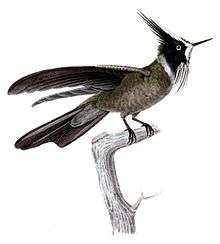Bearded helmetcrest
The bearded helmetcrests (Oxypogon) are a genus of hummingbird in the family Trochilidae. They are found in Colombia and Venezuela. Primary natural habitat is subtropical or tropical high-altitude grassland, known as páramo. 4 different species of this genus were recognized in 2014.[1]
| Bearded helmetcrest | |
|---|---|
 | |
| White-bearded helmetcrest, Oxypogon lindenii | |
| Scientific classification | |
| Kingdom: | Animalia |
| Phylum: | Chordata |
| Class: | Aves |
| Order: | Apodiformes |
| Family: | Trochilidae |
| Subfamily: | Trochilinae |
| Genus: | Oxypogon Gould, 1848 |
| Species | |
|
see text | |
Species
- White-bearded helmetcrest, Oxypogon lindenii
- Green-bearded helmetcrest, Oxypogon guerinii
- Blue-bearded helmetcrest, Oxypogon cyanolaemus
- Buffy helmetcrest, Oxypogon stuebelii
The genus Oxypogon was first described by French ornithologist Auguste Boissonneau in 1840. A study of mitochondrial DNA of hummingbirds shows it to be most closely related to the bearded mountaineer (Oreonympha nobilis) and the rufous-capped thornbill (Chalcostigma ruficeps). The other member of the genus Chalcostigma lay outside the group, suggesting the genus might need revising in the future.[2]
The most common species, the white-bearded helmetcrest, measures 114 mm (4.5 in) in length, it is a small hummingbird with a very small 8 mm (0.31 in) bill. The adult male has a distinctive pointed black crest and a shaggy white beard. The face and cheeks are blackish, rendering a triangular shape with the white fronted crest and white beard. The underparts are a dull green-grey. The female lacks the beard and crest.[3][4]
The species of bearded helmetcrests are found in the Andes, ranging from altitudes of 3,600 to 4,500 m (11,800 to 14,800 ft) in Venezuela,[4] and 3,200 to 5,200 m (10,500 to 17,100 ft) in Colombia.[3] Its main habitat is the páramo, but can descend to the treeline outside of breeding season.[4]
All species often perch on boulders and flit between low-flowering shrubs, visiting the flowers of the genera Espeletia, Echeveria, Siphocampylus, Castilleja and Draba.[4]
All species breed during the rainy season, and nest in the daisy Espeletia or build a nest of material from the daisy in a cliff or bank.[4]
References
- url=http://www.museum.lsu.edu/~Remsen/SACCprop609.htm
- McGuire, Jimmy A.; Witt Christopher C.; Remsen, J. V. Jr; Dudley R.; Altshuler, Douglas L. (2008). "A higher-level taxonomy for hummingbird" (PDF). Journal of Ornithology. 150: 155–65. doi:10.1007/s10336-008-0330-x.
- Steven L. Hilty; Bill Brown (1986). A guide to the birds of Colombia. Princeton University Press. p. 295. ISBN 0-691-08372-X. Retrieved 12 June 2011.
- Steven L. Hilty; Rodolphe Meyer de Schauensee (2003). Birds of Venezuela. Princeton University Press. p. 432. ISBN 0-691-09250-8. Retrieved 12 June 2011.